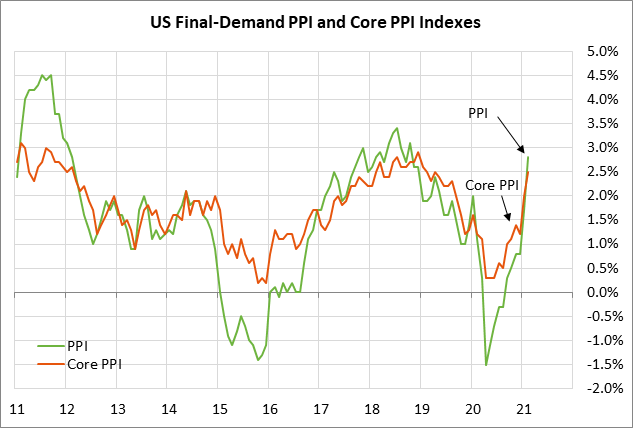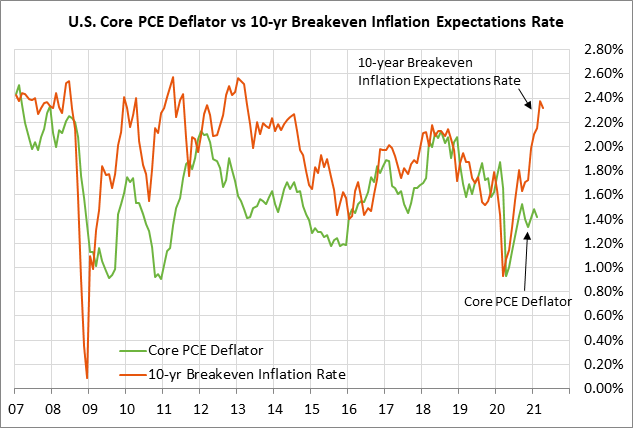- Stocks see support from dovish Fed comments and a 2-week low in T-note yields
- U.S. March PPI expected to jump to +3.8%
Stocks see support from dovish Fed comments and a 2-week low in T-note yields — The S&P 500 index on Thursday rallied to a new record high and closed the day moderately higher by +0.42%. Meanwhile, the Nasdaq 100 index rallied to a 7-week high and closed the day with a solid gain of +1.04%.
Stocks on Thursday saw support from dovish Fed comments and a -5 bp decline in the 10-year T-note yield to a new 2-week low of 1.62%. Fed Chair Powell on Thursday in a virtual appearance at an IMF event reiterated the Fed’s theme that U.S. economy is far from a full recovery and that it is too early to be thinking about tapering QE. Mr. Powell said, “the recovery here remains uneven and incomplete,” and that disparate efforts to vaccinate people globally are a risk for the economic rebound.
Also, St. Louis Fed President Bullard on Thursday said it is “too soon” for the Fed to discuss tapering asset purchases as long as the pandemic continues. Minneapolis Fed President Kashkari said, “there’s still a lot of slack in the economy, and long-run inflation expectations are still solidly anchored around our 2% target.”
Thursday’s dovish Fed comments followed the dovish outcome of Wednesday’s minutes from the March 16-17 FOMC meeting, where policymakers indicated it would likely be “some time” before they scaled back their asset-purchase program.
T-note prices also saw support Thursday from a decline in Germany bund yields. The 10-year German bund yield on Thursday fell to a 1-1/2 week low of -0.35% on the report of the ECB’s March 10-11 policy meeting, which showed policymakers were concerned about the recent rise in bond yields as they stated that “the recent tightening of financing conditions was generally seen as premature for the Eurozone, which was still in a weaker cyclical position than the U.S.”
Also, comments by ECB President Lagarde were bullish for bunds when she said the ECB’s emergency asset purchases “can be recalibrated if required to maintain favorable financing conditions.”
The stock market has been able to shake off news this week about the details of a U.S. proposal for a new global corporate taxation system and a minimum corporate tax. G-20 finance ministers this week set a target of reaching a global tax deal by the middle of this year. There were positive responses about a deal from officials in France, Italy, and elsewhere.
There has been new reporting in the past two days from the Financial Times, Bloomberg and others detailing exactly what the Biden administration is proposing to 140 countries participating in the OECD talks about a new global corporate taxation system. The U.S. is proposing to allow tax sharing on some 100 large international firms with high revenue and profits, not just the U.S. tech companies that are being targeted at present with digital taxes. The U.S. is proposing a new category of high-profit global companies that can pay taxes in countries in which they have customers, broadening attention from tech companies such as Google, Facebook, and Amazon that are U.S.-based.
The Biden administration is also proposing to impose a minimum global corporate tax of 21%, higher than the 12.5% level currently under discussion in the OECD tax talks. The Biden administration wants to halt the “race to the bottom” on corporate taxes and give itself room to raise the U.S. corporate tax rate to 28% from the current 21%, which would be above the 24% median for the G-20 countries.
The Biden administration is relying on a proposed $2.5 trillion hike in corporate taxes over the next 15 years to pay for its $2.25 trillion infrastructure spending bill over the next eight years. The Biden administration is putting a high degree of importance on higher corporate taxes since those taxes would be critical for paying for the administration’s signature infrastructure program.
Meanwhile, Speaker Pelosi said yesterday that she expects President Biden’s infrastructure and social programs to be passed as separate bills, not as one mammoth bill. She said she is hoping that Congress can pass the $2.25 billion infrastructure bill, which the administration is calling the “American Jobs Bill,” before the August recess. The Biden administration is planning to announce the details of its “American Families Plan” later this month. That plan will focus on health, education and other social programs, and will be partially paid for with higher personal taxes on high-income U.S. taxpayers.
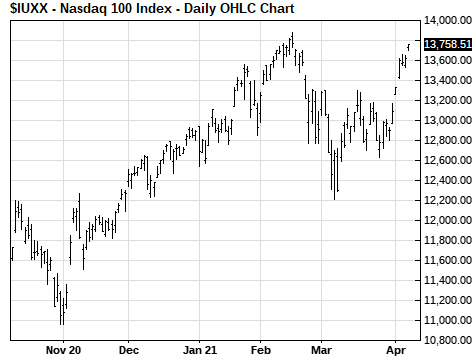
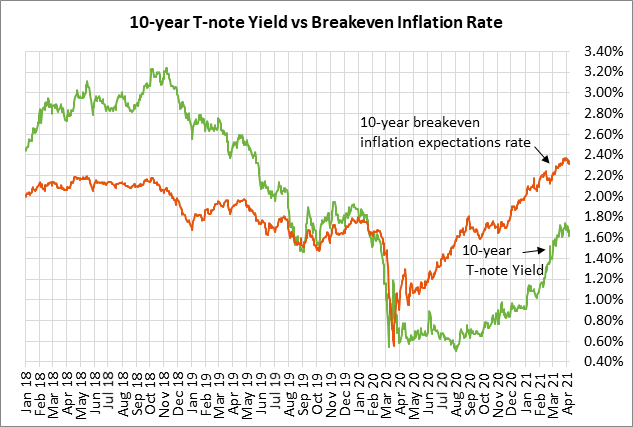
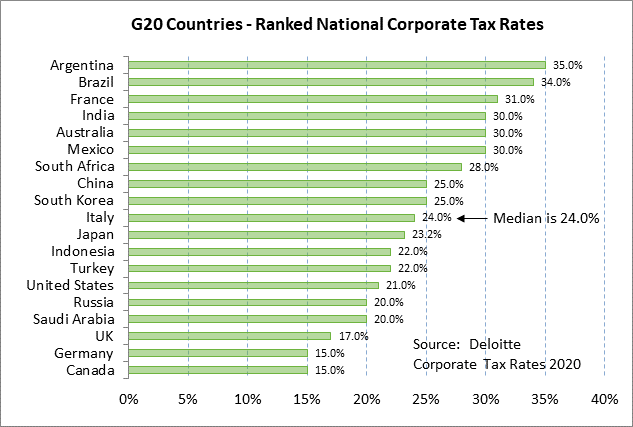
U.S. March PPI expected to jump to +3.8% — Starting today, the markets will get get a look at the extent to which the U.S. inflation statistics will jump in March due to the low year-earlier base that was caused by the pandemic shutdowns. The consensus is for today’s March final-demand PPI to jump to +3.8% y/y from Feb’s +2.8%. Today’s March core PPI is expected to rise to +2.7% y/y from Feb’s +2.5%, which would be well above the Fed’s 2.0% inflation target.
Fed Chair Powell has said that the Fed is expecting higher inflation figures this spring due to the low year-earlier base and bottlenecks caused by the pandemic. However, Mr. Powell says that the Fed expects the increase in the inflation statistics to be temporary and that inflation will eventually ease to more normal levels. The market remains on guard for inflation, with the 10-year breakeven inflation expectations rate currently at 2.34%, just modestly below last Wednesday’s 7-3/4 year high of 2.38%.
